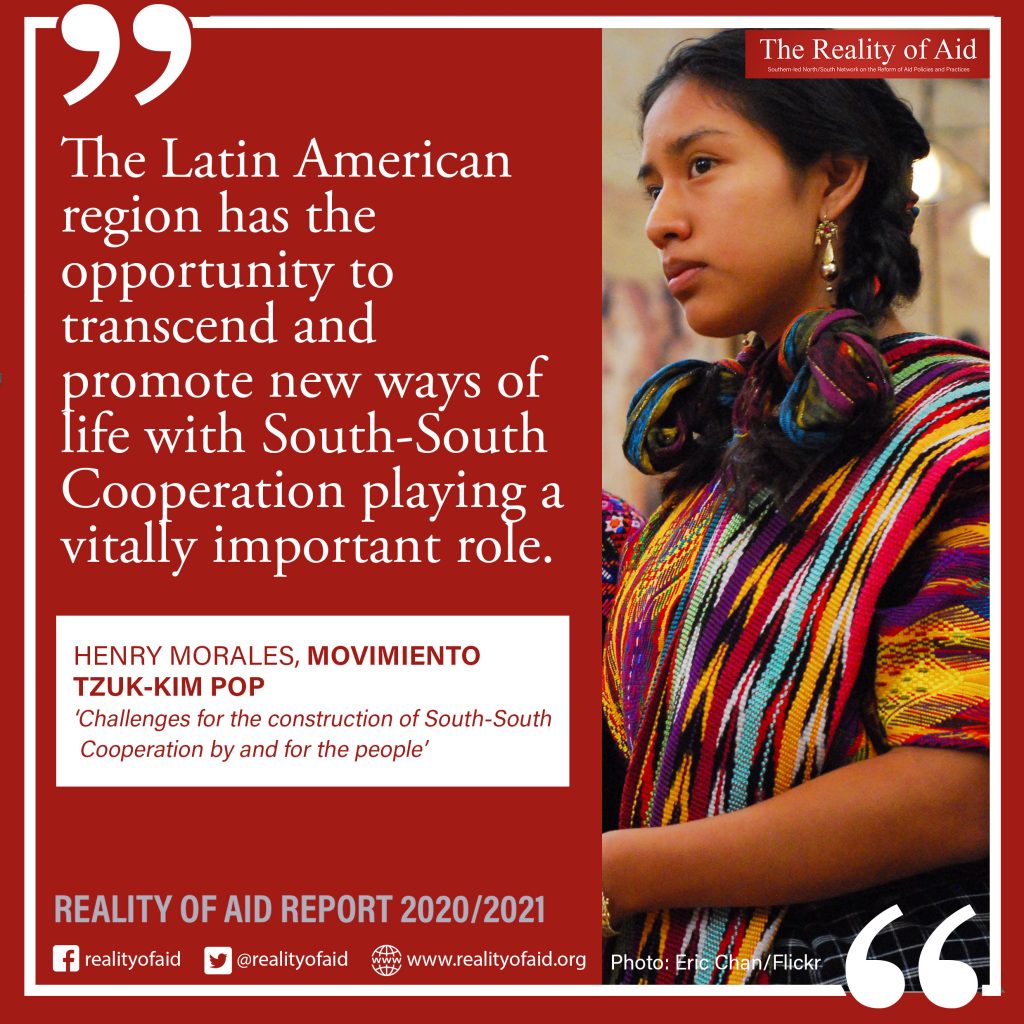
Movimiento Tzuk Kim-pop’s Henry Morales reviews South-South Cooperation in the Latin American and Caribbean region and proposes steps towards a rights-based, people-centred and sustainable development cooperation system.
Henry Morales, Tzuk Kim-pop Movement, Guatemala
This is an excerpt from a chapter in the RoA Report 2020/2021.
Making new proposals for a solidarity-based cooperation in the global South is the main challenge for civil society and governments in the Latin American and Caribbean region, especially one where South-South cooperation (SSC), or cooperation among global South countries, is central in its integration and identity.
The Latin American experience with international relations shows that the reality of marginalization, oppression, discrimination, and poverty cannot be changed through mere finance, but rather through achieving critical consciousness and conviction in the possibility of a new, sustainable, rights-based social system. In pursuing this opportunity, South-South cooperation plays a vital role.
Fundamental is the development of alternatives opposed to the current neoliberal approach. International relations in Latin America have previously been built around geopolitical and economic interests of international governance and financial institutions such as the WTO, OECD, World Bank, IMF, and Organization of American States (OAS). Since the late 1940s, these institutions have maintained a model that is outdated, unviable, and unsustainable for resources.
In establishing a new framework of cooperation, new institutions must likewise be formed. The emergence of regional mechanisms with a Latin American identity, such as the Economic Commission for Latin America and the Caribbean (ECLAC), the Bolivarian Alliance for the Peoples of our America (ALBA) and Union of South American Nations (UNASUR), are transformative steps toward new relationships and modes of participation. Crucial to sustaining these efforts is conducting a critical and purposeful review of the progress made through South-South cooperation in the region. States engaged in SSC must evaluate their methods and actions taken towards improving the impact and sustainability of their contributions.
South-South cooperation as it currently is has the following concerns:
- SSC institutions have had limited political influence despite their role in building new international cooperation governance at high-level fora.
- SSC risks falling into traditional OECD cooperation practices, including political conditioning of aid, promoting geopolitical or economic interests, and ‘tied aid.’ There are already some reports of financial interests from banks and other businesses being considered in SSC frameworks.
- SSC remains relatively unknown, being categorized only by its numbers than its different qualitative contributions.
- SSC lacks specialized bodies at the country or regional levels, with mechanisms mainly based in executive or foreign ministry offices.
- Bilateral-horizontal cooperation remains the dominant form of SSC, representing over 80 percent of relations. Triangular relationships are mostly outward, in cooperation with European or Asian donors. Indigenous peoples and social movements struggle to participate in cooperation processes despite being crucial stakeholders.
- SSC to and from different countries vary in approach, being either structural, goals-oriented, or promoting democratic governance. What must be taken into consideration is that objectives and strategies are sustainable and responsive to the issues being addressed.
- SSCs must be evaluated as to whether they meet participating countries’ interests and demands, sustainably address structural causes of problems, reach vulnerable sectors and communities, ensure recipient countries have the political will to support and monitor the cooperation, and/or establish basic conditions for participation, consultation, and transparency.
- SSC processes must be consultative and inclusive to all sectors and peoples in order to guarantee meaningful change.
- Monitoring and information sharing mechanisms remain to be established to assess coordination among SSC provider countries, with agreed-upon procedures and standards.
- Sustainable mechanisms supporting dialogue among development actors, in particular indigenous communities, civil society, and government, remain to be established in recipient countries.
- Monitoring instruments used by SSC provider countries remain wanting in continuous qualitative and quantitative evaluation, capacity-building of personnel and instrumental components, and implementation at both provider- and recipient-country levels.
- The lack of a well-organized statistical analysis of SSC at the Latin American and Caribbean regional level makes it impossible to provide an accurate account of the impact and significance of SSC for the region.
- Accessible, reliable, and accurate public information remains lacking, an element which is essential in generating support and promoting new forms of cooperation. Updated online digital mechanisms could make this information available.
Addressing these challenges while continuing to move forward with respect for self-determination and sovereignty of peoples in the LAC, confrontation of the neliberal model which produces inequities through unfair trade, debt, and illicit capital, a paradigm of socialization or sharing as opposed to charity, and embracing of democratic values, is the key towards South-South cooperation becoming an effective tool to address inequality and injustice.
